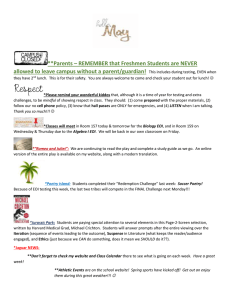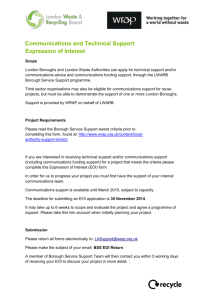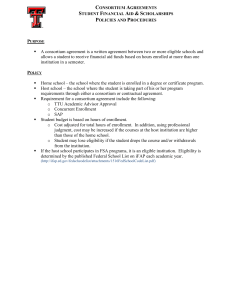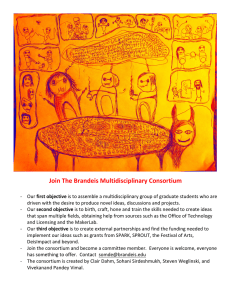CLEAR FREQUENTLY ASKED QUESTIONS FOR FRANCOPHONE AFRICA
advertisement
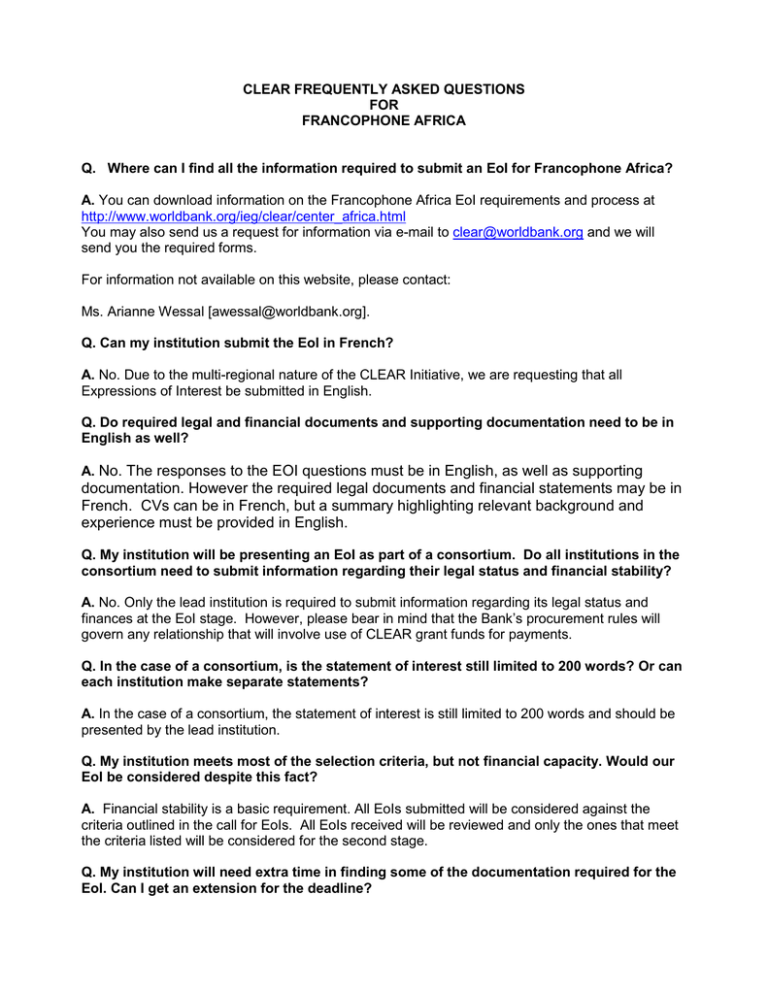
CLEAR FREQUENTLY ASKED QUESTIONS FOR FRANCOPHONE AFRICA Q. Where can I find all the information required to submit an EoI for Francophone Africa? A. You can download information on the Francophone Africa EoI requirements and process at http://www.worldbank.org/ieg/clear/center_africa.html You may also send us a request for information via e-mail to clear@worldbank.org and we will send you the required forms. For information not available on this website, please contact: Ms. Arianne Wessal [awessal@worldbank.org]. Q. Can my institution submit the EoI in French? A. No. Due to the multi-regional nature of the CLEAR Initiative, we are requesting that all Expressions of Interest be submitted in English. Q. Do required legal and financial documents and supporting documentation need to be in English as well? A. No. The responses to the EOI questions must be in English, as well as supporting documentation. However the required legal documents and financial statements may be in French. CVs can be in French, but a summary highlighting relevant background and experience must be provided in English. Q. My institution will be presenting an EoI as part of a consortium. Do all institutions in the consortium need to submit information regarding their legal status and financial stability? A. No. Only the lead institution is required to submit information regarding its legal status and finances at the EoI stage. However, please bear in mind that the Bank’s procurement rules will govern any relationship that will involve use of CLEAR grant funds for payments. Q. In the case of a consortium, is the statement of interest still limited to 200 words? Or can each institution make separate statements? A. In the case of a consortium, the statement of interest is still limited to 200 words and should be presented by the lead institution. Q. My institution meets most of the selection criteria, but not financial capacity. Would our EoI be considered despite this fact? A. Financial stability is a basic requirement. All EoIs submitted will be considered against the criteria outlined in the call for EoIs. All EoIs received will be reviewed and only the ones that meet the criteria listed will be considered for the second stage. Q. My institution will need extra time in finding some of the documentation required for the EoI. Can I get an extension for the deadline? A. No. All institutions should submit their Expression of Interest on or before the deadline (May 13th). No case-by-case extensions will be granted. Q. Which countries in Africa are considered to be part of Sub-Saharan Francophone Africa and are therefore eligible to apply? Institutions from the following countries are eligible to apply to the Francophone Africa Call: Benin, Burkina Faso, Burundi, Cameroon, Central African Republic, Chad, Democratic Republic of Congo, Cote d’Ivoire, Guinea, Madagascar, Mali, Mauritania, Mauritius, Niger, Rwanda, Senegal, Seychelles, Togo Q. If my institution or consortium submitted an Expression of Interest (EoI) to the CLEAR Initiative in the past do we have to submit a new EoI or will CLEAR accept my institution's previous application? A. All institutions and consortiums must submit new EoIs regardless of whether they have submitted an EoI in the past. This is because the application requirements have changed slightly. Q. What does CLEAR mean by a “consortium” of institutions? A. CLEAR defines a “consortium” as a group of institutions that plan to form a long-term relationship for effectively delivering the CLEAR program in the region. The consortium should strengthen the capacity of the applicant (lead) institution to provide a range of M&E services, based on one or more of the following criteria: core skills and knowledge that complements the lead institution’s capacity; experience and knowledge that strengthens the lead institution’s capacity; and ability to reach key clients. All consortiums are required to have a “lead institution”. The lead institution should be located in Sub-Saharan Francophone Africa. Q. Are there a maximum number of institutions that could comprise a consortium? A. To avoid coordination issues, CLEAR suggests a maximum of three institutions per consortium. Q. What is the lead institution’s responsibility in a consortium? A. The lead institution will bear the administrative responsibility and accountability for implementing the CLEAR program in its region. In terms of the substance of the program, the lead institution will need to define its role with respect to the other institutions in the consortium, what the other institutions will contribute to the CLEAR program, and the mechanisms through which the collaboration would work. Q. Can an institution that is not located in Sub-Saharan Francophone Africa be the “lead institution” for a consortium? A. No. The lead institution must be located in Sub-Saharan Francophone Africa. Institutions that are located outside the eligible countries in this region can participate in the consortium but not serve as the “lead institution.” The EoIs, and the final proposals from shortlisted institutions, will need to demonstrate the value-added of the consortium to the lead institution and to the ultimate beneficiaries – government and civil society in the region of interest. Q. Can consulting firms be lead institutions? A. No. Consulting firms may not be lead institutions; however they may form part of a consortium, where the lead institution is an academic institution, non-profit research firm, a think tank, or foundation. Q. Is an institution located in a non-francophone speaking African country eligible to apply? A. At this time, the call for EoIs is to host a center for Francophone Sub-Saharan Africa. Therefore only institutions that are located in those countries are eligible to apply (as either the lead institution in a consortium or as a single institution). However, institutions located in countries outside of the countries listed could be part of a consortium. CLEAR will however not be responsible for providing support directly to the institutions in the consortium. Q. Can a government present an EoI? A. No. Only academic institutions can present an EoI. However, the applicant can demonstrate the ways in which it would collaborate with, or obtain support from, government. At the EoI stage, a clear identification of demand from government and civil society will be key. The demand orientation of this initiative implies that the institution will have to work closely with government and civil society in designing and implementing its work program. Q. How can a government support an institution to host a CLEAR center? A. Evidence of government support in the form of letters, specific demand for courses, and pledges to financially support the work of the center can be included in the EoI. Q. For how long will the selected institution host the CLEAR Center? A. The selected institution will host the center initially for one year. CLEAR’s support will be continued and potentially be expanded in scope for 3-5 years, contingent on funding available and the selected institution’s performance. Q. Regarding the Institution’s previous experience on M&E, do the list of courses and evaluations need to fit in the word limit? A. The selection committee will base its assessments on the EoI. Therefore, the EoI should contain prioritized information for the selection committee to focus on while respecting the word limit. However, if necessary, an annex may be provided. Q. Does the institution need to set up a separate structure for the management of CLEAR funds? A. Financial management and procurement assessments (which CLEAR will initiate and finance, once the center is selected) will dictate what the institution needs to do to manage the funds. However, the institution will need to set up a separate account for the CLEAR funds. The level and type of financial reporting will also depend on the financial management and procurement assessments. Q. How should the institution that will host the CLEAR center conduct M&E? A. As part of the proposal requirements for the second stage of the selection process, an M&E plan is required. In addition, CLEAR will share materials and guidelines and forms on monitoring the implementation of capacity building programs the center might offer. Q. What kind of relationship will the Francophone Africa Center have with the Anglophone Africa Center? A. Although the Centers will each have their own specific work programs at the outset, it is envisioned that there will be opportunities for collaboration in the provision of courses, participation in and hosting learning events and conferences , and in supporting each other in the provision of advisory services if needed. The Centers themselves will drive this relationship. In addition the Centers will all participate in CLEAR-sponsored global learning forums and events.
